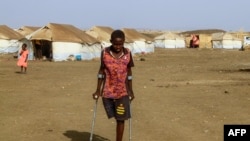The emergency could also further spill into neighboring African countries unless the fighting ends, UN agencies said, ahead of Monday's first anniversary of the conflict erupting.
"Time is running out," said World Health Organization spokesman Christian Lindmeier.
"Without a stop to the fighting and unhindered access for the delivery of humanitarian aid, Sudan's crisis will dramatically worsen in the months to come and could impact the whole region" in terms of more refugees, the spread of disease and food insecurity, he told reporters in Geneva.
"We are only seeing the tip of the iceberg, and the situation could be much more dire in reality."
Fighting in Sudan broke out on April 15 last year between the regular army and the paramilitary Rapid Support Forces.
The conflict has killed thousands and sparked a humanitarian disaster.
More than 8.5 million people have fled their homes, with nearly 1.8 million escaping across the country's borders.
Looming famine
The WHO warned of a collapsing health system, with acute shortages of staff, medicines, vaccines, equipment and supplies.
Lindmeier said 70 to 80 percent of Sudanese health facilities were not functioning due to the fighting.
The UN health agency said medical supplies were at an estimated 25 percent of the needs.
"Some states, such as Darfur, have not received medical supplies for the past year," Lindmeier said.
The UN Development Program and the International Food Policy Research Institute released a report following a survey of 4,504 rural households in Sudan between November and January.
Thair Shraideh, the UNDP resident representative in Sudan, said the country — where two-thirds live in rural areas — was plunging into "an accelerating food security crisis."
"The study warns that a famine in Sudan is expected in 2024, particularly in the states of Khartoum, Al-Jazira, and in the Darfur and Kordofan regions," he said, via video-link from Brussels.
He pointed to production and supply chains having been disrupted, but also to dwindling incomes and soaring inflation.
Even immediate humanitarian and food assistance "may not be enough to stave off the looming famine," Shraideh warned.
An international humanitarian conference for Sudan and its neighbours will be held in Paris on Monday.
It will aim to tackle a shortfall in funding, with only six percent of the estimated $2.7 billion needed to address the crisis having been raised so far.


Forum